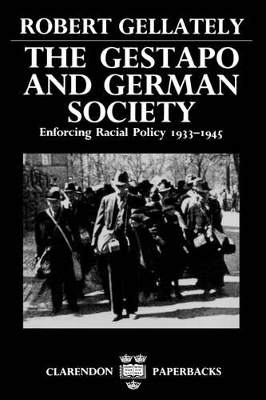Clarendon Paperbacks
1 total work
This book examines the everyday operations of the Gestapo, the Nazi secret police. How were the Gestapo able to detect the smallest signs of non-compliance with Nazi doctrines, especially `crimes' pertaining to the private spheres of social, family, and sexual life? How could the police enforce policies such as those designed to isolate the Jews or foreign workers with such apparent ease?
Robert Gellately argues that there was a three-way interaction between the police, the German people, and the implementation of policy; and that the key factor in the enforcement of Nazi racial policy was the willingness of German citizens to provide the authorities with information about suspected `criminality'.
Robert Gellately argues that there was a three-way interaction between the police, the German people, and the implementation of policy; and that the key factor in the enforcement of Nazi racial policy was the willingness of German citizens to provide the authorities with information about suspected `criminality'.
